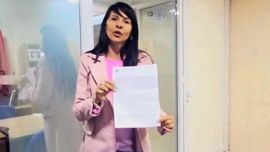President Alberto Fernández had an eventful first day on Tuesday at the G20 Leaders Summit in Bali, the victim of a "gastritis" which, nevertheless, did not prevent him from meeting up with Chinese leader Xi Jinping.
Argentina’s president had pinned his hopes on his second meeting of this year with Xi, extracting from him a pledge to expand the currency swap agreements with the Bank of China to the tune of US$5 billion.
"President Xi informed us that he had authorised the Chinese government to give Argentina free disposal of 35 billion yuan, which means US$5 billion," said Fernández after the meeting.
The currency swap between two countries carries no cost while the money is not used but may be counted in the reserves, in this case Argentina’s. Until now this mechanism has reached 130,000 billion yuan, or some US$18.5 billion, in agreement with China but Buenos Aires has been pressing for an expansion for months. Chinese state media did not mention this pact in their reports on the meeting between the two leaders.
This agreement means "counting on US$5 billion more in the reserves when it comes to the Central Bank acting to boost our currency," Economy Minister Sergio Massa told the press after the bilateral meeting.
The last time the two presidents met – last February on the occasion of the Winter Olympics in Beijing – Argentina joined the Chinese Belt and Road Initiative macro-project, which, according to the Casa Rosada, will imply financial investments of over US$23.7 billion.
‘Hypotension and dizziness’
During much of the first morning of the top-level meeting in Bali, Fernández "suffered an episode of hypotension and dizziness" which obliged his absence from the debates between G20 leaders to enter hospital for a check-up.
There he was diagnosed with "an erosive gastritis with signs of bleeding," a bulletin from the Presidential Medical Unit indicated, adding: "He received the corresponding medical treatment and finds himself in good health, renewing his activities under medical control."
"I thank everybody for their concern. I’m well, working fine," the president said later.
Nevertheless, the low blood pressure caused Fernández – the only Latin American leader present in Bali given the absences of Brazil’s Jair Bolsonaro and Mexico’s Andrés Manuel López Obrador – to be also absent from the debate sessions scheduled for the first day of the summit.
Following medical recommendations, he also skipped the gala dinner organised by the Indonesian president hosting the summit while on Wednesday his programme was restricted to a meeting with International Monetary Fund (IMF) Managing Director Kristalina Georgieva and an event with Spanish Prime Minister Pedro Sánchez.
‘Recovering peace’
At the first meeting of the day, centred on food security, Foreign Minister Santiago Cafiero took charge of delivering the speech prepared for Fernández.
The minister asked the leaders "to recover peace and contribute to global recovery," underlining the "effects of war" worldwide.
Given an annual inflation of 88 percent over the last 12 months in Argentina, and the possibility of reaching 100 percent by the end of the year, the minister affirmed that the conflict had cost the country at least US$5 billion.
"In the Northern Hemisphere the merchants of death negotiate lethal weapons but in the Southern Hemisphere food becomes expensive and scarce so what ends up killing are not the bullets or missiles but poverty and hunger," he said.
The foreign minister underlined the especially negative impact of the war in Latin America, which has already been profoundly punished by the pandemic, going back 27 years in time in its poverty levels, according to the Economic Commission for Latin America and the Caribbean (CEPAL in its Spanish acronym) of the United Nations.
"Latin America and the Caribbean has become the region of the world which has lost the most years in terms of life expectancy. Now we must face the effects of the war," he affirmed.




















Comments